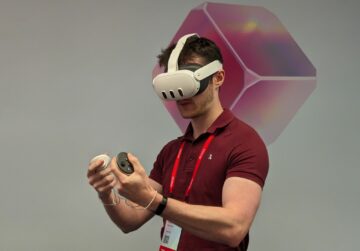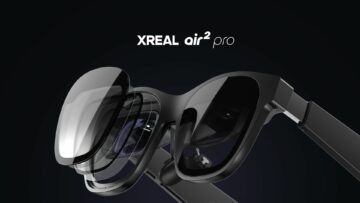YouTuber Bradley Lynch found evidence of a Valve standalone VR headset in SteamVR driver files, and Ars Technica says its sources confirm its existence.
Valve Index, the company’s $999 tethered PC VR kit, has now been on the market for more than two years. It still has best-in-class tracking and audio quality but its 1600×1440 resolution is lower than both Facebook’s $299 Oculus Quest 2 (1832×1920) and HTC’s Vive Pro 2 (2448×2448).
The new headset is reportedly codenamed “Deckard”, the surname of Blade Runner’s protagonist and a possible reference to Valve’s Steam Deck handheld PC.
On his channel, SadlyItsBradley, Lynch reveals that the Deckard codename was present in a Lighthouse (Valve’s positional tracking technology) driver file and a SteamVR input driver. The input driver apparently added references to “Deckard POC-A” in January of this year and “Deckard POC-C” in June, with POC likely standing for Proof of Concept.
When asked last month by The Verge whether Steam Deck’s chip could be used in a standalone VR headset, product designer Greg Coomer replied it “would run well in that environment” and teased “it’s very relevant to us and our future plans”. However, in July Valve had cautioned the chip’s performance isn’t intended for the extreme demands of VR.
Lynch found a “Standalone System Layer” option in the hidden ‘Valve Internal’ menu tab of SteamVR, as well as a Linux-only binary referencing Deckard which he says tells the device to boot to a default application. Remember that Steam Deck runs SteamOS, Valve’s distro of Linux. A further reference to “Dual Tracking Mode” suggests the headset could have inside-out tracking while optionally supporting Lighthouse.
In March Valve filed a patent for a head strap referencing a wireless VR headset. Lynch notes that a driver called VRLink was added to SteamVR this year with code referencing a WiFi 6 driver, and this update actually temporarily broke some HTC Vive wireless setups. These findings suggests Deckard could have PC VR streaming functionality similar to Facebook’s Oculus Air Link.
Ars Technica says its sources confirm Valve had at least two VR headset concepts in the works which diverged over time, with one requiring a PC and tracking base stations but the other (presumably Deckard) operating standalone with onboard compute like Oculus Quest. These sources also claim Valve initially struggled to get inside-out tracking to match Oculus Insight’s quality so brought in an outside firm for help (Arcturus Industries?).
Ars notes, however, that Valve has begun dedicating its manufacturing lines to the Steam Deck portable console, and doubts the company has the capacity to also ship a new standalone VR headset at scale in the near term given the ongoing global chip shortage. Ars also notes Valve has a long history of varied internal prototyping and killing projects before they’re announced.
If Deckard really is a standalone headset Valve intends to ship as a product, it would provide much-needed competition for Facebook’s Oculus Quest line and could go head-to-head with the in-development Quest Pro.
Source: https://uploadvr.com/valve-deckard-standalone-wireless-headset-reports/
- 100
- announced
- Application
- audio
- BLADE
- Capacity
- chip
- code
- company
- competition
- Compute
- content
- Designer
- driver
- Firm
- future
- Global
- head
- Headset
- history
- HTC
- htc vive
- HTTPS
- IT
- July
- kit
- Line
- linux
- Long
- manufacturing
- March
- Market
- Match
- Near
- Oculus
- Oculus Quest
- operating
- Option
- Other
- patent
- PC
- performance
- PoC
- present
- Pro
- Product
- projects
- proof
- proof of concept
- protagonist
- prototyping
- quality
- quest
- Reports
- Run
- Scale
- So
- Standalone VR Headset
- Steam
- SteamVR
- streaming
- system
- Technology
- tells
- time
- Tracking
- Update
- us
- valve
- verge
- vive
- vr
- VR Headset
- VR Streaming
- wifi
- wireless
- works
- year
- years
- youtube










